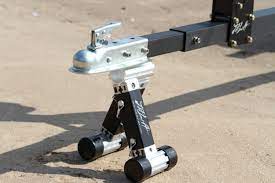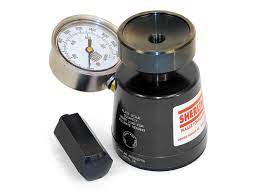How to Measure Tongue Weight
Those with experience towing know that there are many things that can make pulling a load very difficult so it is vital to get the setup right before you pull away. One of the factors that can cause you major towing issues is tongue weight and in this article we will help you get this right to make your important tasks run smoothly.
What Is Tongue Weight?
Tongue Weight, which is often abbreviated to TW, is a measure of the downward force applied at the connection between the tow vehicle and the trailer. As a general rule of thumb the tongue weight should be somewhere between 10 – 15% of the total trailer weight.

The reason it is so important to measure the tongue weight is that a properly loaded trailer is essential to ensure safe towing. It is important to keep in mind the Gross Trailer Weight or GTW.
Why Is Correct Tongue Weight Important for Towing?
It is important to know the tongue weight of your load as this is essential to the towing process. If you do not know the tongue weight you run the risk of creating a driving hazard not only to yourself but to other road users.
If the tongue weight is too heavy there is a risk that you may lose vehicle responsiveness during cornering and braking. If the tongue weight is too light your trailer may begin to sway and when this happens it is not going to progress in a straight line.
A fishtailing load will not only make it harder for you to maintain control of your vehicle but may also pose a hazard to those behind you or looking to overtake you. A sudden sharp fishtail of a trailer can also cause you to lose control and potentially crash.
Whichever way you look at it you do not want a tongue weight that is too heavy or too light. Towing is an already risky proposition without creating potential hazards for yourself.
How to Measure Tongue Weight on a Trailer
There are several ways in which you can determine the tongue weight and in doing so you can take steps to alter your load to more safely tow it. These measurement methods include:
Using a Tongue Weight Scale
The easiest way to calculate the correct tongue weight without having to go out with an untested load is with a tongue weight scale. This is a simple piece of equipment that you can get for less than $200. If you frequently use a trailer this can be a lifesaving investment.

This is a small piece of equipment which has been specifically designed to measure the weight pushing down on the connection between trailer and vehicle. When preparing to take a measurement make sure that everything that is going to be on the trailer is already loaded.
The steps for use are as follows:
- Load up the trailer and make sure that both car and load are parked on a flat, hard and level surface.
- Place the tongue weight scale beneath the tongue jack and lower it down until the jack is pressing on the scale.
- Avoid lowering any other jacks then detach your trailer from the truck, you should now see a reading of the weight.
- Note: If your tongue weight scale has different instructions for use adhere to these this is only a general guide.
Using a Commercial Scale for Measuring Tongue Weight
If you do not want to spend money on buying a scale you can also make use of a commercial scale. You can typically find these at a truck stop , quarry or material supply center. You will again have to make sure you are all loaded up and ready to go before heading to your nearest scale.
Note: Take it easy on the drive over, without knowing the tongue weight you could be poorly balanced so drive as slowly as is safe and do not travel far.
- The steps for commercial weighing
- Weigh your vehicle without the trailer hooked up
- Weigh your vehicle with the trailer attached but make sure the wheels of the trailer are not on the scale. The aim is to get your vehicle weight and tongue weight not the trailer weight at this point.
- Finally, weigh the vehicle and trailer together. Subtract the weight without the trailer attached and what is left should equal your trailer tongue weight.
Measuring With a Weight Distribution Hitch
A weight-distribution hitch is a very helpful piece of equipment when it comes to towing a trailer. It is actually suggested that you use one of these devices if you plan to tow a trailer for a long distance. The first step is knowing the weight of the gear you plan to load behind the rear axle of the tow vehicle. This amount will then be added to the total tongue weight.
- Weigh your vehicle with the gear you plan to haul
- Next weigh the vehicle without the gear loaded up
- Subtract the weight without gear from the loaded weight to get your total gear weight
- Add the total weight of your gear to the tongue weight
Select the correct weight distribution hitch to support the total amount of tongue weight
How to Calculate Tongue Weight Adjustments
Each vehicle has a maximum towing capacity that it can tow safely. It is important to make sure you are not trying to tow anything beyond your vehicle's limitations. Make sure you know the weight of what you are towing. This will include the load and the trailer weight.
- Using commercial scales first weigh your car without the trailer and load. This gives you your Gross Vehicle Weight (GVW)
- Next, weigh the car and load the trailer together. This is the Gross Combined Vehicle Weight (GCVW)
- The simple equation for the trailer weight is GCVW – GVW = GTW (Gross Trailer Weight)
- If you find you are over or under the correct tongue weight you may find you need to rearrange your load. As an example if the tongue weight is low, move more of your load closer to the front of the trailer or closer to the back of your vehicle.
- When you make adjustments to the trailer load still try to keep it fairly well balanced as a massively unbalanced load can cause issues as well.
Conclusion
Tongue weight is a very important consideration when towing so you should make sure you know roughly what this value is for your load. You do have a little wiggle room as it should be between 10 – 15% of the total load of the trailer.
Finding some way to measure tongue weight is your best option as guessing can lead to major issues that may endanger not just your own safety but that of other road users as well.
Link To or Reference This Page
We spend a lot of time collecting, cleaning, merging, and formatting the data that is shown on the site to be as useful to you as possible.
If you found the data or information on this page useful in your research, please use the tool below to properly cite or reference Tow Ratings as the source. We appreciate your support!
-
<a href="http://towratings.net/blog/how-to-measure-tongue-weight/">How to Measure Tongue Weight</a>
-
"How to Measure Tongue Weight". Tow Ratings. Accessed on April 19, 2024. http://towratings.net/blog/how-to-measure-tongue-weight/.
-
"How to Measure Tongue Weight". Tow Ratings, http://towratings.net/blog/how-to-measure-tongue-weight/. Accessed 19 April, 2024
-
How to Measure Tongue Weight. Tow Ratings. Retrieved from http://towratings.net/blog/how-to-measure-tongue-weight/.